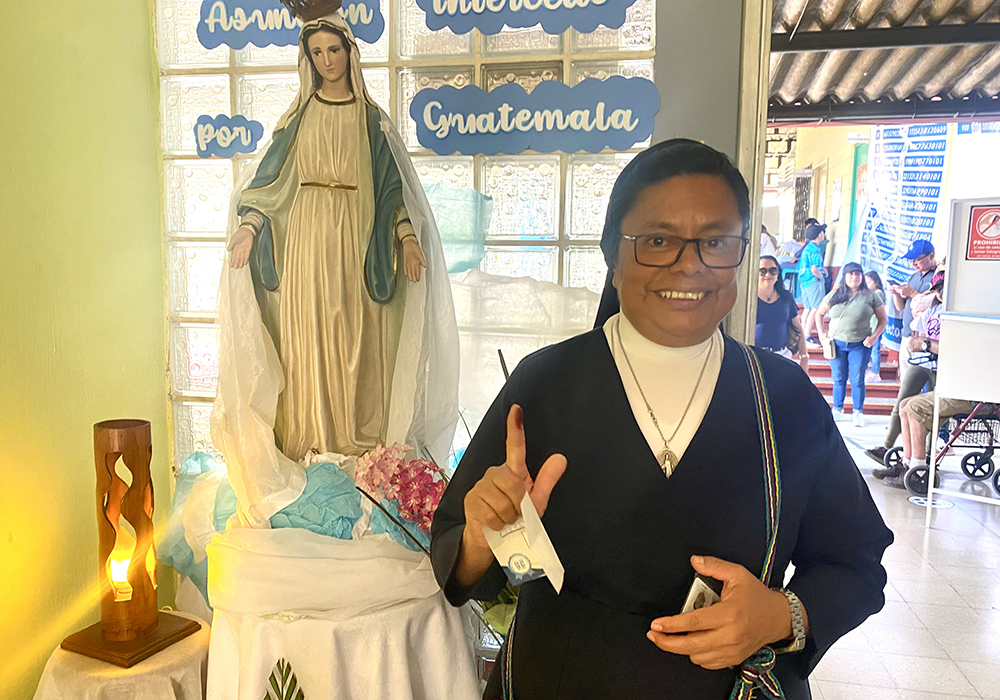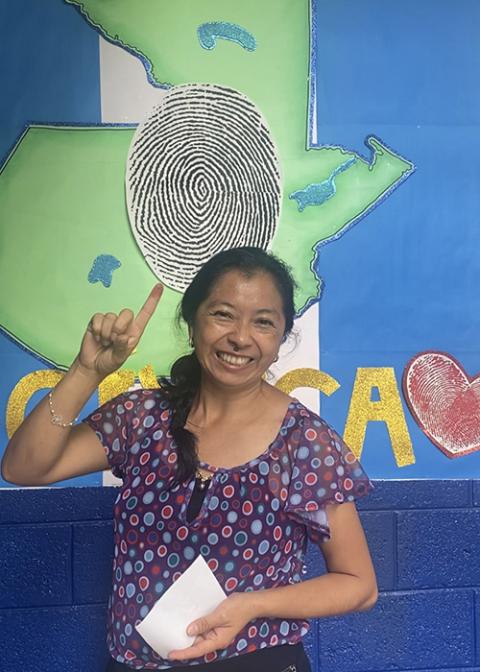
Sr. Rosa María Reyes poses for a photo in front of a statue of Our Lady of the Assumption after voting at a school Aug. 20 in Guatemala City. Guatemala wasn't just voting for a candidate but for change it desperately needs, she said. (NCR photo/Rhina Guidos)
Guatemalans tired of institutional political parties on Aug. 20 elected Bernardo Arévalo, a former diplomat who had little chance of winning two months ago, as their next president.
Odds were stacked against Arévalo and his scarcely known center-left Movimiento Semilla (Seed Movement) political party. But on Sunday, his victory brought a temporary jubilance to Guatemalans who say they are tired of parties like that of his primary opponent Sandra Torres, a former first lady who ran for president for the third time under the populist conservative National Unity of Hope (or UNE) party.
Arévalo garnered 58% of the vote and Torres almost 37% with 98% of the vote counted, but enough for the Supreme Electoral Tribunal to project his victory late Sunday.
In a late night press conference, Arévalo said the people of Guatemala were sending a message with their vote.
"What the people shout is 'enough of so much corruption,' " he said.
"His austere and surprising candidacy has captured the sentiment of frustration of the Guatemalan people," Erwin Jose Noguera, of the Catholic Radio Emaus in Guatemala City, told National Catholic Reporter Aug. 20, adding that a large part of Arévalo’s popularity is a reaction against "the traditional politics that have governed for the last 12 years."
The result, more than a vote for Arévalo, seems to be about Guatemalans' search for a way out of the corruption that has fattened the coffers of the country's rich and powerful, leaving little for the eroding middle class and increasing poor.

Linda Cecilia Orozco Citalán shows off her inked finger, proof that she voted in Guatemala's run-off election Aug. 20. The election felt like a "civic fiesta," said Orozco, a Catholic psychologist, who said there's an eroding middle class in the country, something that voters like her want to see change with their choice for president. (NCR photo/Rhina Guidos)
Guatemala practically has no middle class anymore, said psychologist Linda Cecilia Orozco Citalán. The runoff election made voters like her feel some sort of control and even happy about the opportunity to be heard, she said.
Guatemala City's streets were full of traffic Sunday and a voter let out a celebratory cry at the polling station where Orozco cast her ballot. Orozco told NCR it felt more like a "civic fiesta" but also a duty, as a good Christian and good Catholic, to head to a voting booth.
Catholics such as Orozco and Zulia Monge de Tánchez said they didn't buy Torres' political messages aimed at faith voters, saying her party opposed abortion and supported family values.
Monge de Tánchez said she felt the messages were 'manipulative," especially coming from someone like Torres, who divorced her husband, former president Álvaro Colom, so she could run for office since Guatemala's constitution prevents close relatives of a president from seeking the post.
Torres' actions and behaviors speak more about her character than the political messages her party sent out, said Monge de Tánchez. She said she saw good signs of things to come in the enthusiasm for Sunday's vote.
"This wasn't the normal Sunday traffic you see in Guatemala," she told NCR. "People wanted to vote and it reflects our desire to be a democratic country and not continue on the path we're on today … with injustice, with a lot of corruption, with the country's three branches of power co-opted by the same corrupt power."
In the first round of voting on June 25, more voters cast a blank or nullified ballot than for Torres or Arévalo, each garnering less than 20% of the small turnout. But the top two candidates of that vote, Torres and Arévalo, moved on to the Aug. 20 run-off. Political winds blew into Arévalo’s sails, however, after he moved into the No. 2 spot as a relative unknown with no allegiances to the country's ruling parties of the past, even though he is the son of a former president.
Some wondered whether those in power would allow democratic elections, and a possible win by Arévalo, vowing to fight corruption, to take place. Shortly after his second-place showing in the first round of elections, his party's offices were raided and a lower court tried to get his Semilla party disqualified from participating in the elections.
Guatemala's Cardinal Álvaro Ramazzini, of the Diocese of Huehuetenango, invited international faith groups, including some from the U.S., such as Faith in Action and Hope Border Institute of El Paso, to Guatemala for the elections.
But the attacks against Semilla and Arévalo seemed to have had a positive effect on his campaign as many Guatemalans saw them as a last-ditch effort by desperate corrupt political actors to hold on to power.
"With their vote, the Guatemalan people showed the world their remarkable resilience and that, even in the face of an entrenched corruption that goes all the way down, they have faith in democracy and they have faith in a better future," Dylan Corbett, Hope Border's executive director, told NCR Aug. 20.
"The United States now has a chance to rewrite a history fraught with injustice and inequality in Central America by partnering on equal footing with the new government to work for a just and sustainable economy that works for local communities and that offers people real pathways of hope beyond migrating north," he said.
Advertisement
And hope is something the country desperately needs, said Sr. Rosa María Reyes, a member of the Daughters of Charity of St. Vincent de Paul in Guatemala City. After voting, she smiled for a photo in front of a Marian statue with the words "Our Lady of the Assumption, intercede for Guatemala."
"It's a time of hope, a time for something new," Reyes said. "We need something new to give our people hope. We need justice, education, health care."
Lack of basic necessities are leading the country's youth to take one of two paths, she said: to migrate or to suicide. Only God knows what the future holds, she said, but what was clear in this election is that people wanted change.
"People want jobs with dignity, to be able to sustain a family. Poverty has driven people to desperation," she said.
Her hope, she said, is for a democracy that will allow Guatemalans to carry out lives of dignity so that they don’t have to leave or die. And the general feeling in the country is that there is a path forward, but only with the eradication of corruption, she said.
"We hope this will be the beginning of a path of dignity, toward a more just society that we desperately need," she said.








